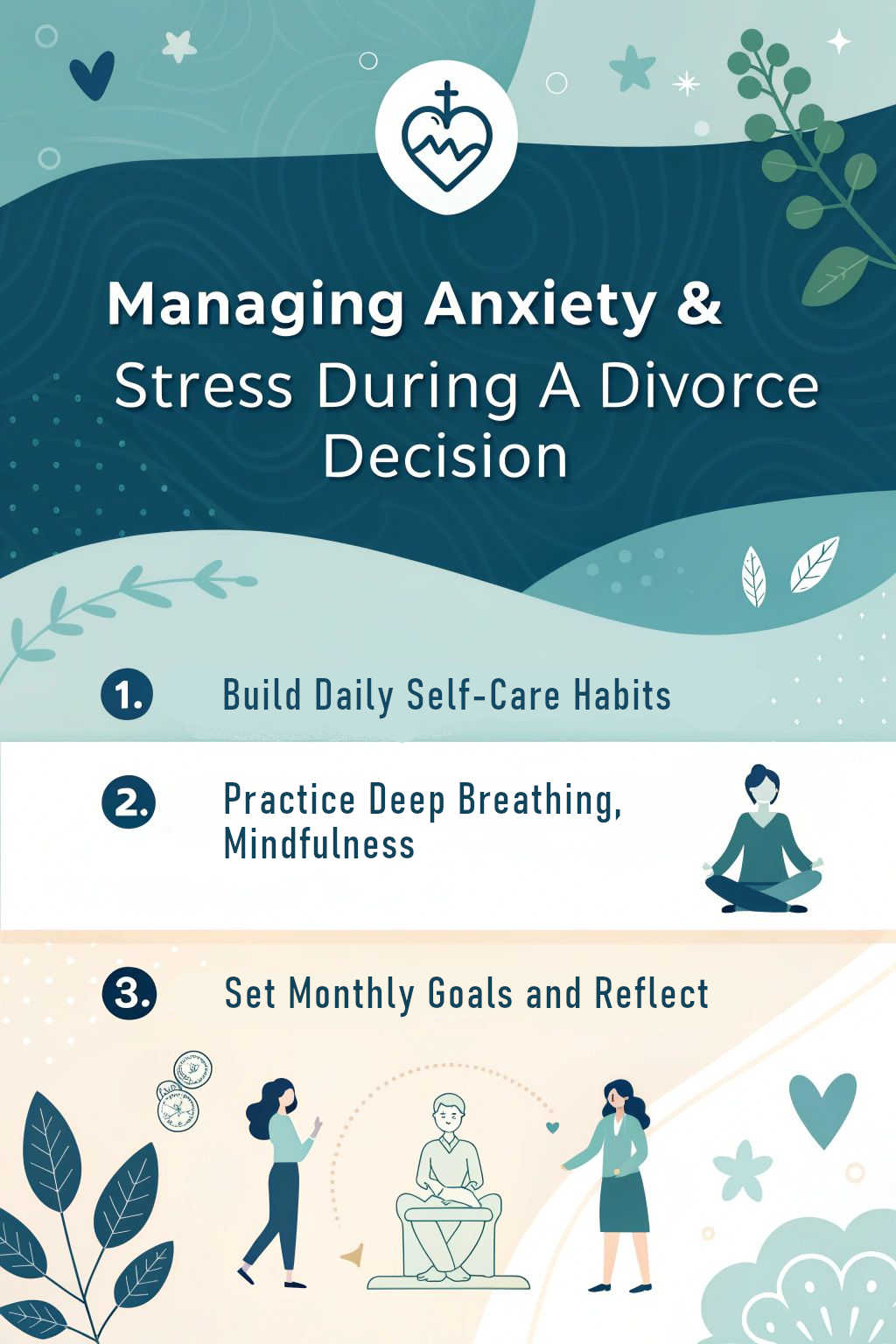Managing Anxiety & Stress During A Divorce Decision
Going through a divorce feels like riding an emotional roller coaster. The stress and anxiety can weigh heavy on your heart and mind. You’re not alone – studies show 65% of people struggle with deep anxiety when facing divorce decisions.
As a mental health professional, I’ve helped many people find their way through this storm. Let me share proven ways to handle the tough feelings, lean on friends and family, and keep your head clear during this challenging chapter.
With the right support and tools by your side, you can navigate this path one step at a time.

Acknowledge and Validate Your Emotions
Divorce brings up many strong emotions – anger, fear, sadness, and even relief. I learned through my own divorce that pushing these feelings away only made things worse. My therapist taught me to name each emotion as it came up and write it down in my gratitude journal.
This simple act helped me accept my feelings without judgment.
Physical symptoms like tension, racing thoughts, and mood swings are normal parts of emotional distress during divorce. Deep breathing exercises and progressive muscle relaxation became my daily tools for managing acute anxiety.
Taking time to meditate and practice self-compassion gave me mental clarity to handle tough decisions about custody and child support. These coping skills helped me build emotional resilience while working through grief and loneliness.
Practice Self-Care
Self-care forms a vital shield against divorce-related stress. I make time each day to focus on my physical and mental well-being through simple actions that boost my energy and mood.
Maintain a healthy diet and sleep schedule
I make my diet and sleep a top priority during stressful times. My morning starts with a protein-rich breakfast, followed by small meals throughout the day to keep my energy levels steady.
Fresh fruits, vegetables, and whole grains help fuel my body with the right nutrients. A regular sleep schedule – going to bed at 10 PM and waking up at 6 AM – keeps my mind clear and focused.
Good food choices and proper rest play a huge role in managing stress. The foods on my plate affect my mood and emotional state. My daily menu includes salmon for omega-3s, nuts for healthy fats, and plenty of water to stay hydrated.
Physical exercise combined with proper nutrition helps me sleep better at night. Eight hours of quality sleep gives my brain time to process emotions and reduces feelings of anxiety.
Engage in regular physical activity
A balanced diet and good sleep habits work better with regular exercise. My morning runs have become a lifeline during this tough time. Physical activity releases natural mood boosters in the brain.
These chemicals help reduce stress and anxiety levels. Moving the body through exercise creates positive changes in both mind and body.
Exercise doesn’t need to be complex or time-consuming. A brisk 30-minute walk, yoga session, or dance break can make a real difference. The key lies in picking activities that feel good and fit into daily life.
Regular workouts have helped me stay focused during divorce talks. Physical movement serves as a natural stress-buster and energy booster. Many people find that working out with friends adds social support to the health benefits.

Build a Support Network
I found strength in talking to my friends and family during my own divorce – they became my rock through the tough times. My support group met every Tuesday, and these amazing people understood exactly what I was going through because they’ve walked the same path.
Stay connected with family and friends
My family and close friends became my lifeline during my divorce process. These special people listened to my worries without judgment and offered comfort during tough days. Talking with them helped me deal with stress and made me feel less alone.
Phone calls, text messages, and coffee dates kept me connected to my support system.
Staying social helped me cope with anxious thoughts and prevented self-medicating behaviors. Regular chats with my sister about parenting plans and legal separation gave me practical advice.
Meeting friends for walks or sharing meals created normal moments during this big change. Support groups can offer another layer of understanding from people going through similar experiences….
Join a support group
Support groups have become my lifeline during tough divorce moments. Local divorce support groups meet twice a week at the community center, where I share stories with people facing similar challenges.
The national alliance on mental illness (NAMI) offers free support groups that focus on stress management and emotional health. These meetings create a safe space to express feelings without judgment.
The group sessions teach practical coping mechanisms through guided meditation and deep breathing exercises. I practice these techniques at home to manage daily stressors better. The group members share useful tips about self-care, child development, and decision-making during divorce.
Meeting others who understand my situation helps reduce feelings of despair and isolation. Support groups provide a mix of emotional support and practical advice for handling divorce-related issues like spousal maintenance, debts, and negotiations.

Use Mindfulness Techniques
I practice mindfulness techniques to calm my racing thoughts during my divorce process – meditation helps me stay grounded in the present moment. My therapist taught me to focus on my breath and body sensations, which pulls me away from worrying about court dates or custody battles.
Practice meditation or deep breathing exercises
Deep breathing exercises help me stay grounded during tough divorce moments. My favorite technique involves sitting quietly, closing my eyes, and taking slow breaths through my nose.
The simple act of counting each breath – in for four counts, hold for four, out for four – creates a natural rhythm that calms racing thoughts.
Guided meditations through apps make this process easier and more structured. Five minutes of mindful breathing each morning sets a peaceful tone for the day. The practice brings clarity to emotions and reduces chronic stress.
Deep breathing activates the body’s relaxation response, which lowers blood pressure and heart rate – perfect for managing divorce-related anxiety.
Focus on staying present
I stay focused on the present moment through simple mindfulness practices. My mind often races ahead during stressful divorce talks, but guided imagery helps me return to now. A quick body scan or five minutes of deep breathing pulls me back to this exact moment – away from past regrets or future fears.
The present moment offers a safe space to process difficult emotions about my changing life. My therapist taught me to notice small details around me – the warmth of sunlight, the sound of birds, or the feeling of my feet on the ground.
These tiny observations keep my thoughts from spiraling into anxiety about divorce paperwork or custody schedules. Staying present through mindfulness gives me strength to face each day’s challenges one moment at a time.

Seek Professional Help
Professional help from a therapist can guide you through tough emotions during divorce. A mental health expert will teach you proven ways to handle stress and create a clear path forward.
Consult a therapist or counselor
I reached out to a mental health professional during my divorce process, and it made a huge difference in my healing. A therapist helped me work through complex emotions, develop coping strategies, and create a clear path forward.
My counselor used cognitive-behavioral methods to shift my mindset from stress to empowerment.
Family counseling sessions gave me tools to handle tough situations with my ex-spouse. The sessions focused on self-care, stress management, and personal development. My therapist taught me relaxation techniques to calm my nerves during legal meetings.
The support from a trained professional made me feel less alone in my journey.

Plan for the Future
I focus on creating clear goals for my next chapter after my divorce. My gratitude journal helps me track my progress and stay positive while I work with my psychologist to map out my new path.
Set realistic goals and expectations
My goals during divorce must stay simple and clear. Small steps help me move forward without feeling too much pressure. A gratitude journal tracks my progress and keeps me focused on positive changes.
My therapist taught me to break down big tasks into smaller ones – like updating legal papers or finding a new place to live.
The path ahead needs realistic timelines and expectations. Money goals matter too, from planning the mortgage to avoiding bankruptcy. My psychologist suggests setting three main targets each month.
These targets should match my current situation and energy levels. Physical health goals deserve attention through proper rest and exercise.
Conclusion
The path through divorce brings real challenges, yet you possess the strength to face them. Mental health professionals stand ready to guide people through tough choices and emotional storms.
Your well-being matters – take small steps each day toward healing through self-care, support groups, and mindfulness practices. The future holds fresh starts and new possibilities for growth after making this brave decision.
FAQs
1. How can I cope with stress during divorce?
Dr. O suggests taking care of yourself through journaling, talking to mental health professionals, and deep breathing with slow exhaling. A gratitude journal can help lift your mood during hard times.
2. Should I try marriage counseling before divorce?
Yes – marriage counseling helps couples work through issues like substance abuse and poor communication. A skilled psychiatrist can guide you toward the best choice for your future.
3. What steps can I take to protect my mental health during divorce?
Self-help and self-improvement activities are key for mental wellness. Focus on activities that feel cathartic, and maintain your daily motivation through exercise and healthy habits.
4. How do I handle divorce mediation?
Divorce mediation helps settle matters like spousal support and probate issues. The process puts the best interests of the children first while reducing stress for all parties.
5. Where can I find professional support during divorce?
TheTeenDoc and other health professionals offer specialized support for people facing divorces. They provide tools to manage depression and anxiety during this major life change.



